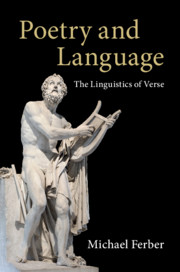Book contents
- Poetry and Language
- Poetry and Language
- Copyright page
- Dedication
- Contents
- Illustrations
- Acknowledgments
- Chapter One Introduction
- Chapter Two Meter and the Syllable
- Chapter Three Rhyme
- Chapter Four Onomatopoeia and Sound Symbolism
- Chapter Five Unusual Word Order and Other Syntactic Quirks in Poetry
- Chapter Six The Meaning of a Poem
- Chapter Seven Metaphor
- Chapter Eight Translating Poetry
- Appendix Quantity and Pitch in Greek Verse
- Works Cited
- Index
Chapter Two - Meter and the Syllable
Published online by Cambridge University Press: 02 October 2019
- Poetry and Language
- Poetry and Language
- Copyright page
- Dedication
- Contents
- Illustrations
- Acknowledgments
- Chapter One Introduction
- Chapter Two Meter and the Syllable
- Chapter Three Rhyme
- Chapter Four Onomatopoeia and Sound Symbolism
- Chapter Five Unusual Word Order and Other Syntactic Quirks in Poetry
- Chapter Six The Meaning of a Poem
- Chapter Seven Metaphor
- Chapter Eight Translating Poetry
- Appendix Quantity and Pitch in Greek Verse
- Works Cited
- Index
Summary
Before writing systems were invented, starting around 5,000 years ago, all poetry was oral, and some poetry today, even in societies with universal literacy, is still composed and performed without the aid of writing. When poets learned to write, poetry changed. Thanks to the work of Milman Parry (1902–35), we are now almost certain that the Iliad and the Odyssey, for example, were largely composed orally by an illiterate bard, or more likely by a long series of illiterate bards who recomposed and elaborated the stories they inherited. Homer and his predecessors, it seems, did not so much memorize their long poems as reconstruct them each time they performed them, rather as a jazz musician may improvise a good deal of his or her piece while preserving its tune and following the main lines of its theme-and-variation structure and many individual “riffs.” The main evidence for the oral origin of the epics lies in the “formulas” that pervade both of them: the epithets such as “swift-footed” (Achilles) and “shepherd of the people” (Agamemnon), whole lines such as the one about “rose-fingered Dawn” (twenty times verbatim in the Odyssey), and stock descriptions such as arming for battle or serving and eating food. Later epic poets, such as Apollonius in Greek and Virgil in Latin, seldom repeat phrases and almost never repeat lines, for they could write and rewrite their poems at leisure and then read them aloud or recite them from memory to an audience.
- Type
- Chapter
- Information
- Poetry and LanguageThe Linguistics of Verse, pp. 16 - 57Publisher: Cambridge University PressPrint publication year: 2019



